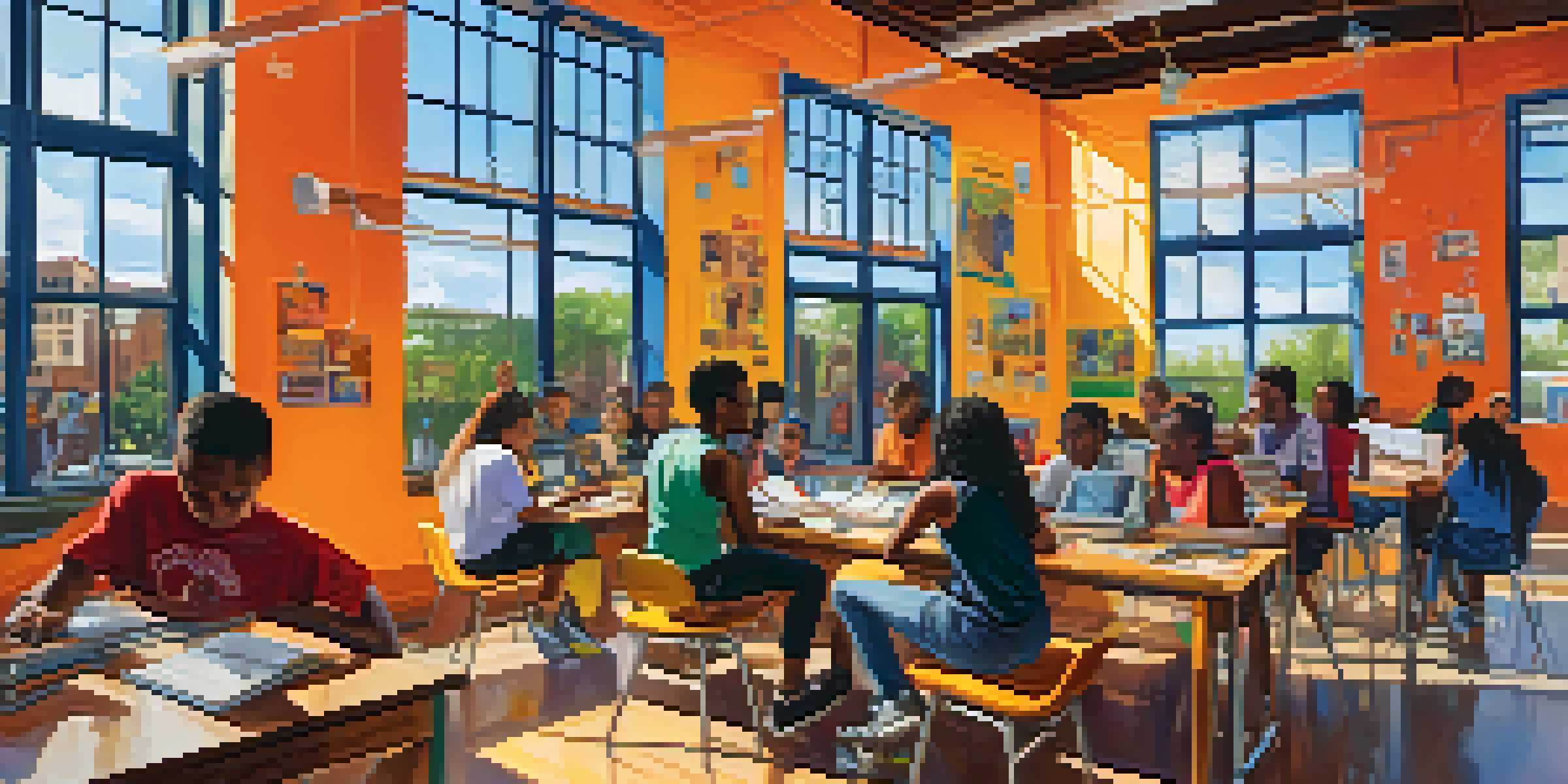Empowering Austin Youth: Local Initiatives for Lasting Change

Understanding the Need for Youth Empowerment in Austin
Austin, a vibrant city, is home to a diverse population, including a significant number of youth who face various challenges. These challenges range from educational disparities to limited access to resources that could help them thrive. Recognizing these issues is the first step toward creating programs that genuinely impact young lives.
The greatest danger in times of turbulence is not the turbulence; it is to act with yesterday's logic.
Empowerment isn't just about providing resources; it's about instilling confidence and a sense of agency in young people. When youth feel empowered, they are more likely to pursue their dreams and contribute positively to their community. Local organizations are stepping up to bridge the gap between potential and opportunity, ensuring that every young person has a chance to succeed.
By understanding the specific needs of Austin’s youth, these initiatives can tailor their programs to address the unique challenges faced by different demographics. This targeted approach not only maximizes impact but also fosters a sense of belonging among participants, which is crucial for their personal development.
Community Programs Making a Difference
Several community programs in Austin are dedicated to empowering youth through education, mentorship, and skill-building. For instance, organizations like Big Brothers Big Sisters of Central Texas match young people with mentors who guide them through personal and academic challenges. These one-on-one relationships can profoundly influence a child's life trajectory.

Another notable initiative is the Austin Youth Council, which gives young people a platform to voice their opinions and ideas about local issues. By engaging in civic activities, youth not only learn about governance but also feel a sense of ownership over their community's future. This active involvement is key to developing responsible, informed citizens.
Empower Youth Through Community Support
Austin's youth need empowerment programs that provide resources, mentorship, and a sense of belonging to overcome challenges.
Additionally, programs that focus on arts and culture, such as the Young Artists Program, provide creative outlets for self-expression. These initiatives not only enhance artistic skills but also promote mental health and emotional well-being, showing youth that their voices matter in all aspects of life.
The Role of Schools in Youth Empowerment
Schools play a pivotal role in empowering youth, serving as a primary environment for learning and growth. Many Austin schools have begun to adopt holistic approaches that prioritize social and emotional learning (SEL) alongside academic achievement. SEL equips students with essential life skills, such as empathy and resilience, which are crucial for navigating challenges.
Youth is not a time of life; it is a state of mind.
Programs like the Positive Behavioral Interventions and Supports (PBIS) have been implemented in various schools to create supportive learning environments. By promoting positive behavior and recognizing student achievements, schools foster a culture of encouragement that helps students thrive. When students feel supported, they are more likely to engage actively in their education.
Furthermore, partnerships between schools and local organizations enhance the resources available to students. These collaborations can provide after-school programs, tutoring, and extracurricular activities that broaden students' horizons and equip them with valuable skills for the future.
Leveraging Technology for Youth Engagement
In today's digital age, technology offers exciting opportunities to engage and empower youth. Many local initiatives in Austin are harnessing the power of technology to provide innovative learning experiences. For example, organizations are using online platforms to offer coding workshops, allowing youth to develop crucial skills for tomorrow's job market.
Moreover, social media has become a powerful tool for youth activism and community engagement. Young people in Austin are using these platforms to raise awareness about important issues, mobilize support, and create positive change. This digital engagement not only empowers them but also fosters a sense of community among peers who share similar passions.
Mental Health is Essential for Growth
Access to mental health resources and education is crucial for helping young people navigate adolescence and develop resilience.
However, it's essential to ensure that all youth have access to technology and digital resources. Bridging the digital divide is a critical aspect of empowering the next generation, and initiatives that provide access to devices and internet connectivity are vital in leveling the playing field.
The Importance of Mental Health Support
Mental health is a crucial component of overall well-being, especially for young people navigating the complexities of adolescence. In Austin, several initiatives focus on providing mental health resources, ensuring that youth have access to counseling and support services. Programs like the Youth and Family Services offer workshops and resources that address mental health awareness and coping strategies.
Creating a safe space for youth to discuss their feelings and challenges is essential for fostering resilience. Initiatives that promote mental health awareness in schools and communities help reduce stigma and encourage open conversations. When young people feel comfortable seeking help, they are more likely to thrive personally and academically.
Additionally, incorporating mental health education into school curriculums empowers youth with the knowledge to understand their emotions. This proactive approach not only helps students manage stress but also equips them with tools to support their peers, creating a more caring and supportive community.
The Impact of Volunteerism on Youth Development
Volunteering is a powerful way for youth to develop skills, build self-esteem, and contribute to their community. Many Austin-based initiatives encourage young people to engage in volunteer work, helping them learn the value of giving back. This experience not only enriches their lives but also fosters a sense of responsibility and connection to their community.
Programs like the Austin Volunteer Organization offer various opportunities for youth to get involved, from environmental clean-ups to mentoring younger students. These experiences provide hands-on learning that can be transformative, allowing youth to see the direct impact of their efforts. Additionally, volunteering can enhance college applications, showcasing a commitment to community service.
Volunteerism Builds Skills and Connections
Engaging in volunteer work allows youth to develop valuable skills, foster self-esteem, and build a supportive community network.
Moreover, engaging in volunteerism helps youth build a diverse network of connections, which can be beneficial for future opportunities. The relationships formed through these experiences can lead to mentorship and job prospects, further contributing to their personal and professional growth.
Building a Supportive Network for Austin Youth
Creating a supportive network for youth involves collaboration among families, schools, local organizations, and the broader community. In Austin, various stakeholders are coming together to create a nurturing environment for young people to thrive. This collective approach ensures that youth have access to the resources they need to succeed.
Parent and guardian involvement is crucial in this network. Programs that educate families about available resources and encourage their participation in youth initiatives can significantly enhance the impact of these programs. When families are engaged, youth feel more supported and motivated to take advantage of the opportunities presented to them.

Furthermore, community events that bring together families, educators, and organizations foster a sense of belonging. These gatherings not only provide valuable information but also allow youth to connect with peers and mentors, creating a robust support system that can guide them through challenges and celebrate their successes.